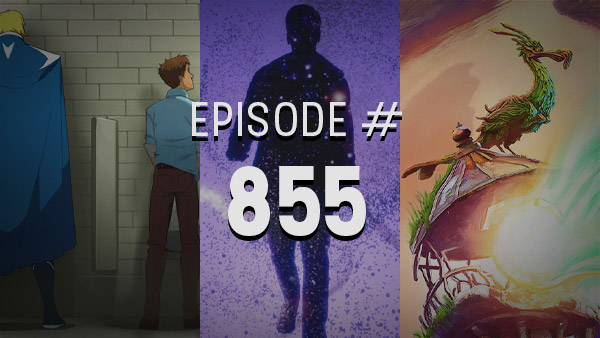Your login information returned multiple users. Please select the user you would like to log in as and re-type in your password.

Arguably the most important part of any narrative is character motivation. Giving characters a reason for their actions and habits is an integral part of constructing a three dimensional character. Not only that, but knowing a character's motivation also gives motivation for the player. Of course, the motivation for anyone playing a game is to, well, play the game, but adding that motivation in can give the player something extra. It can help them really understand the character they play as and the other characters they interact with. It helps to better immerse them into the game's world and enjoy the game that much more.
We as human beings have motivation behind all of our actions. We go to school to secure a better chance at a career, we get a job because it provides us money, we play games because it is enjoyable, etc. When crafting a character, you almost have to plot out their entire life in this manner. You have to stop and think why these characters do, say, or think in the ways that they do. That's not to say you need extensive flashbacks every five seconds to show a character's life story, but a character's actions should be explainable and make sense to the player.
One should also never accept “because it's a video game” as a viable excuse for a lack of motivation. Let me provide an example from an experience I recently had. I finally got around to playing through the first Bioshock over the holidays and that very first scene where you are able to control your character has one flaw within it. Your plane crashes, you're stranded at a lighthouse, and you walk around to notice all the strange imagery and propaganda. It doesn't take long before you will stumble upon an open bathysphere and inside is a glowing lever that will prompt you to “press x” once you approach it. Now, my question is, why would this character enter the bathysphere? It makes sense for the player to do so because the game is prompting us to advance, but why does the character want to enter and pull the lever?

That lighthouse had several signs with bits of propaganda, none of which the character wanted to interact with apparently, so what made this lever so special? A commercial airplane going down in the middle of the ocean won't exactly be ignored. The plane even went down right next to the lighthouse so rescue teams will more than likely search there first. That rules out the possibility of desperation for survival, which was, really, the only viable reasoning that I could think of. Once you take that plunge and enter Rapture everything else eventually falls into place, but that initial lighthouse scenario just doesn't add up.
In the grand scheme of things, the Bioshock example really doesn't detract from that game at all; it's just the most blatant example of, “It's a video game, so we don't have to give character motivation just yet”. To someone like myself who values the writing in a game above all else, it's just an annoyance to see that kind of laziness put into a game that does put a focus on the narrative. It really was just as simple as having the lighthouse be further away from where the plane crashed. Less chance of rescue teams coming by, no floating luggage to rummage through for supplies. Right there, you have taken away this character's ability to survive an extended stay in this lighthouse. Even being a silent protagonist, we can all understand the desperation that would have set in for someone in that situation. With little chance of being found and nothing for food or water, anyone would have jumped right into that bathysphere and hoped it led to someplace better.
So, that leads into my next point which is about giving characters motivation. One of the easiest way to make a character motivated is to take something away from them. Tidus from FFX lost his home to Sin, several origin stories from DA:O involve the main character’s loss of a home or family, the main character from Fable 2 loses a family member to some madman, etc. Loss is something most of us have had to experience in our lives, so it is easy to sympathize with a character that goes through just that. We feel sorry for them and can understand why they would go off to get revenge or throw away their old lives for a new opportunity. Right there, you already have the character set up for their motivation and the player is invested in this character. A game can accomplish this within the first few hours of a game at the maximum if the developers just take that extra bit of care and thought into those opening scenes.

Another easy way to motivate a character is to present something they want, but is not easily attainable. Jimmy Hopkins from Bully, for example, has a mother that constantly remarries to men who don't seem to care about Jimmy, thus his character has grown to resent authority figures that don't treat him with respect. When he gets to Bullworth and meets Crabblesnitch, the man who runs the school, the two clash almost instantly. From then on, Jimmy wants to “rule the school” in order to spite the headmaster. Jimmy wants to tear down this imposing authority figure and be the one in charge for once in his life and that motivates all of his actions throughout the course of the game. That's not to say every game needs to go into that kind of depth to deliver character motivation. It could just be as simple as a character being greedy so they become a mercenary, bounty hunter, or treasure hunter. This person likes having money to throw around, but doesn't want to take up a mundane job to have that luxury. Nice and simple.
Of course, there is also the survival/self defense method of character motivation. Self preservation is the most basic instinct we all have. When our lives are threatened or we are in danger of some kind, those instincts kick in and we do whatever it takes to push through those hardships. With this method, a backstory almost becomes pointless. No matter who this person is, where they grew up, what they do for a living, all of that becomes pointless the second a story's main focus becomes survival. It may be nice to get occasional glimpses into this character's past or personality, but it certainly isn't necessary. Those snippets should also be kept small and infrequent to only serve as minor distractions before refocusing on survival again.
Surprisingly enough, a game like Left 4 Dead handled this very well. The whole point of the game is to get from point A to point B while surviving hordes of zombies and attacks from the special infected. Whenever the game has quiet moments to let the player breathe; however, is when the characters themselves will actually talk to each other. Their banter is kept brief to only serve as a minor distraction and is usually added for comedic effect, but it still reveals quite a bit about those four characters. Sure, the most common dialogue you'll hear are just cues for the player to perform some kind of action, but those moments in the safe rooms allow for the actual character interaction to occur while still keeping the player focused on gunning down the infected and surviving.

By no means do games need to incorporate overly complicated backstories or character motivations. Putting too much detail into those facets can actually bog down a narrative or make a character less interesting over time. If your narrative calls for a Jimmy Hopkins, then delve into the character's psyche. If the characters are just out to survive, then add some occasional banter or small conversation between the survivors. How deep and intricate a character's motivation needs to be varies from game to game. Left 4 Dead's pacing would have suffered from overly long cut scenes of dialogue, while Bioshock would have remained the exact same even with that slight change to the game's opening scene. By no means should “it's a video game” ever be an excuse to not properly motivate a character. The key is to just find the right kind of motivation that fits into the game.




Comments
12 years, 8 months ago
" It doesn't take long before you will stumble upon an open bathysphere and inside is a glowing lever that will prompt you to “press x” once you approach it. Now, my question is, why would this character enter the bathysphere?"
Did you finish the game? If not, I'd love to tell you why, but I won't.
That is all.
12 years, 8 months ago
I have to say Seesaw, these types of posts about how to make a good story or character really help me with my own stories. So, thanks for writing them :D